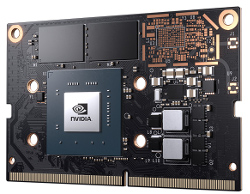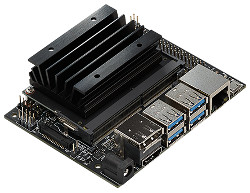Trimmed-down Jetson Nano module ships on $99 Linux dev kit
Mar 19, 2019 — by Eric Brown 7,487 views Nvidia has launched a stripped-down, quad -A57 Jetson Nano module with a CUDA-ready 128-core Maxwell GPU. There’s also a maker-friendly, $99 dev kit featuring the Linux-driven, AI-focused COM.
Nvidia has launched a stripped-down, quad -A57 Jetson Nano module with a CUDA-ready 128-core Maxwell GPU. There’s also a maker-friendly, $99 dev kit featuring the Linux-driven, AI-focused COM.
At the GPU Technology Conference, Nvidia spun a version of its Arm-based, GPU-focused Jetson modules for the Linux maker market along with a $99 Dev Kit. The company also announced support for Amazon’s AWS IoT Greengrass for all its Jetson modules and unveiled a new Nvidia Drive Constellation autonomous vehicle simulation platform, among other announcements.


Jetson Nano (left) and Jetson Nano Dev Kit
(click images to enlarge)
The Jetson Nano “delivers 472 GFLOPS of compute performance for running modern AI workloads and is highly power-efficient, consuming as little as 5 watts,” says Nvidia. The module “lets you run multiple neural networks in parallel for applications like image classification, object detection, segmentation, and speech processing,” says the company. Applications include entry-level Network Video Recorders (NVRs), home robots, and “intelligent gateways with full analytics capabilities.”
The 70 x 45mm module is equipped with 4x 1.43GHz Cortex-A57 cores and a 128-core Maxwell GPU with CUDA-X AI and 4K@60 support. It also integrates 4GB LPDDR4 and 16GB eMMC 5.1.
— ADVERTISEMENT —
Previous Jetson modules such as the TX1, the hexa-core TX2, and to a lesser extent, the much more advanced Jetson AGX Xavier, have seen increasing adoption by commercial embedded Linux vendors. Yet, there has yet to be a version affordable enough to appeal to the maker community. Now, Nvidia has filled in the low end of its Jetson family with a scaled-back Jetson Nano module and a maker-friendly development board. Both ship with a JetPack SDK with support for machine learning platforms and “full desktop Linux support.”
Like Google, which recently released an open-spec, $150 Coral Dev Board to expand the use of its Edge TPU AI chip with the help of an NXP i.MX8M SoC, Nvidia is taking the community-backed hacker board route to promote its GPU-heavy Tegra processors with their CUDA libraries for machine learning. One key difference is that while the Jetson Nano Developer Kit is fairly well documented and includes an open source software kit, tutorials, user forums, and a design for a Jetbot robot, it currently lacks the schematics and other open source files available with the Coral Dev Board and most other Linux hacker boards.


Jetson Nano Dev Kit (left) and loaded onto Jetbot
(click images to enlarge)
The Jetson Nano Developer Kit is available for pre-order at $99 with shipments due in April. The Nano module on its own will begin shipping in June with pricing starting at $129 in 1K quantities. The Jetson Nano design and the same Jetpack 4.2 SDK are similar enough to the TX2 that you can prototype on the Nano dev kit and flesh out the design on a TX2 platform. Backward compatibility, however, is more sketchy. (See farther below for more on the Jetson Nano Developer Kit.)
Jetson Nano
The Jetson Nano is smaller than the 87 x 55mm TX2 at only 69.6 x 45mm. Like the Jetson TX1, it offers 4x Cortex-A57 cores clocked to 1.43GHz. By comparison, the Jetson TX2 features a hexa-core design with dual high-end “Denver” cores and 4x Cortex-A57 cores and the Xavier has a more powerful octa-core design.
Like all Jetson modules, it’s not the Tegra CPU, but the CUDA-enabled GPU that is the star of the show. The Nano uses the earlier Maxwell GPU class found on the TX1, but instead of the TX1’s 256 Maxwell cores, you get 128. By comparison, the TX2 has more advanced 256-core Pascal graphics, and the Xavier has a much more capable 512-core Nvidia Volta GPU with 64 tensor cores. Like the TX2, however, you get 4K@60 decode and 4K@30 encode via H.264 and H.265.
The Nano’s 128-core Maxwell GPU offers more GPU horsepower than you’d get from the usual Mali, Vivante, or PowerVR GPU found a typical hacker board. This is particularly true if you want to run deep learning, vision processing, and other AI algorithms thanks to the Jetson/Tegra associated CUDA libraries.
The Nano can use the same CUDA-X AI acceleration libraries as other Jetson modules. The Linux4Tegra and Linux Kernel 4.9 driven Jetpack SDK also includes the latest versions of cuDNN, TensorRT, CUDA Toolkit, PyTorch, Caffe, MXNetm, VisionWorks, GStreamer, and OpenCV.
Like the TX1, the Nano has 4GB RAM and 16GB eMMC, although in this case it’s faster LPDDR4 and eMMC 5.1. The TX2 offers twice those capacities.
Like the TX1 and TX2, the Nano features a GbE controller, but it lacks the earlier modules’ onboard WiFi and Bluetooth. Instead of the 400-pin board-to-board connector found on the TX1 and TX2, the Nano has a SODIMM-style, 260-pin edge connector.
Media I/O includes dual displays with HDMI 2.0 or DP1.2, eDP 1.4, and DSI. There are also 12x lanes of 1.5Gbps MIPI-CSI-2.
The module supports a single USB 3.0 hub interface that supports four ports, as well as 3x USB 2.0 and “1 x1/2/4 PCIe.” You also get 2x SPI, 6x I2C, 2x I2S, various GPIOs, and an SDIO interface. The module runs at 5-10W.
Jetson Nano Dev Kit
The sandwich-style, $99 Jetson Nano Dev Kit includes a version of the Jetson Nano that appears to lack the 16GB eMMC stated in the Nano’s specs. This suggests that a similar “Lite” version of the module may also be available to volume customers.


Jetson Nano Dev Kit (left) and detail views
(click images to enlarge)
The 100 x 80mm Jetson Nano Dev Kit has a typical design for a mid-range hacker board. Like the Raspberry Pi 3B+, it offers a GbE port with PoE support, a microSD slot, 4x USB ports, a micro-USB device port with power support, an HDMI port, a MIPI-CSI input, and a 40-pin GPIO header. It’s unclear if the GbE port is full-speed or is limited to 300Mbps like the Pi.
The USB host ports are 3.0 compared to 2.0 for the Pi, and the HDMI is 4K-ready 2.0 instead of 1.4. You also get a 4K-ready eDP port instead of the Pi’s composite A/V connection.

Jetson Nano Dev Kit portside view
(click image to enlarge)
Unlike the RPi 3B+, there’s no onboard WiFi/Bluetooth, but there is an M.2 expansion slot that would support it. The MIPI-CSI interface supports IMX219 camera modules, including the Leopard Imaging LI-IMX219-MIPIFF-NANO and Raspberry Pi Camera Module V2.
There’s no pin assignment chart for the GPIO, and it’s unclear if interfaces such as I2S and SPI are available there or are found on the separate serial headers or on their own individual headers. There’s also a 5V power jack and a heatsink.
Specifications culled from the various Jetson Nano Dev Kit documentation resources includes:
- Processor (via Jetson Nano) — 4x Cortex-A57 @ 1.43GHz; 128-core Maxwell GPU with CUDA-X AI support, etc.
- Memory/storage:
- 4GB 64-bit LPDDR4 @ 25.6 GB/s(via Jetson Nano)
- MicroSD slot
- Networking — Gigabit Ethernet port with PoE support
- Media I/O:
- HDMI 2.0 port
- eDP 1.4 port
- 1x MIPI CSI-2 DPHY lane
- I2S audio (possibly via 40-pin or serial headers)
- Other I/O:
- 4x USB 3.0 host ports
- Micro-USB 2.0 device port (supports 5V/2A power)
- Serial port header
- SPI (possibly via 40-pin or serial headers)
- Button header, fan connector
- Expansion:
- 40-pin header with GPIOs, power, I2C SDA and SCL, UART TX and RX
- M.2 Key E slot for wireless and other PCIe/USB
- Other features — Heatsink
- Power — 5V/4A DC via power jack, header, or micro-USB; 5-10W active consumption
- Dimensions — 100 x 80 x 29mm
- Operating system — Linux4Tegra (Linux 4.9) via Jetpack 4.2 SDK
Further information
The Nano module on its own will begin shipping in June with pricing starting at $129 in 1K quantities. The Jetson Nano Dev Kit is said to be available now at Arrow for $99, but the shopping page currently states “no stock available” and notes a 16-week manufacturer lead time. In the coming days or weeks, you will also be able to buy the kit directly from Nvidia. More information may be found in Nvidia’s Jetson Nano Dev Kit product page, datasheet (PDF) and user guide (PDF).

Nano User’s Guide pdf updated URL
https://developer.nvidia.com/embedded/dlc/jetson-nano-dev-kit-user-guide
Thanks fjanon.
We’ve made the correction.